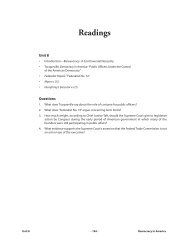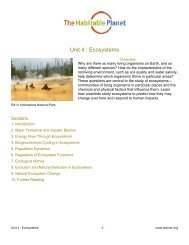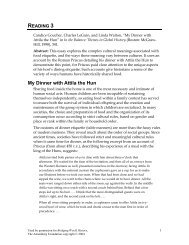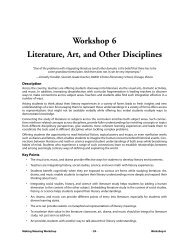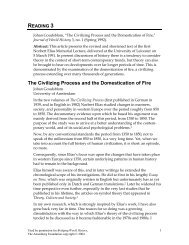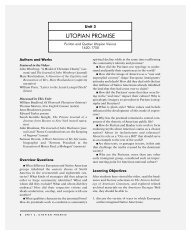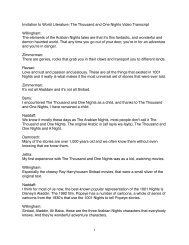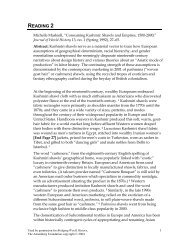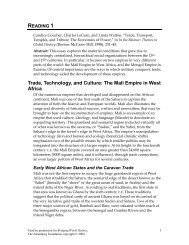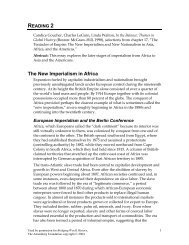Ethics Reader
Ethics Reader
Ethics Reader
Create successful ePaper yourself
Turn your PDF publications into a flip-book with our unique Google optimized e-Paper software.
Plato<br />
From Republic (c. 360 B.C.)<br />
[Plato's Republic is a conversation—Socrates talking with others. In Book I, the dialogue includes<br />
conversations with Cephalus, his son Polemarchus, both coming from wealth, and the Sophist Thrasymachus.<br />
Socrates's approach is teaching through questioning, what has become known as the Socratic method.]<br />
Book I<br />
[Socrates speaking.]<br />
. . . may I ask another question? What do you consider to be the greatest blessing which you<br />
have reaped from your wealth?<br />
[Cephalus speaking.]<br />
One, he said, of which I could not expect easily to convince others. For let me tell you,<br />
Socrates, that when a man thinks himself to be near death, fears and cares enter into his<br />
mind which he never had before; the tales of a world below and the punishment which is<br />
exacted there of deeds done here were once a laughing matter to him, but now he is<br />
tormented with the thought that they may be true: either from the weakness of age, or<br />
because he is now drawing nearer to that other place, he has a clearer view of these things;<br />
suspicions and alarms crowd thickly upon him, and he begins to reflect and consider what<br />
wrongs he has done to others. And when he finds that the sum of his transgressions is great<br />
he will many a time like a child start up in his sleep for fear, and he is filled with dark<br />
forebodings. But to him who is conscious of no sin, sweet hope, as Pindar charmingly says,<br />
is the kind nurse of his age . . .<br />
How admirable are his words! And the great blessing of riches, I do not say to every man,<br />
but to a good man, is, that he has had no occasion to deceive or to defraud others, either<br />
intentionally or unintentionally; and when he departs to the world below he is not in any<br />
apprehension about offerings due to the gods or debts which he owes to men. Now to this<br />
peace of mind the possession of wealth greatly contributes; and therefore I say, that, setting<br />
one thing against another, of the many advantages which wealth has to give, to a man of<br />
sense this is in my opinion the greatest.<br />
Well said, Cephalus, I replied; but as concerning justice, what is it?—to speak the truth and<br />
to pay your debts—no more than this? And even to this are there not exceptions? Suppose<br />
that a friend when in his right mind has deposited arms with me and he asks for them when<br />
he is not in his right mind, ought I to give them back to him? No one would say that I ought<br />
or that I should be right in doing so, any more than they would say that I ought always to<br />
speak the truth to one who is in his condition.<br />
You are quite right, he replied. But then, I said, speaking the truth and paying your debts is<br />
not a correct definition of justice.<br />
Page 17



